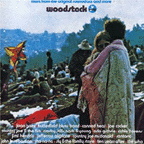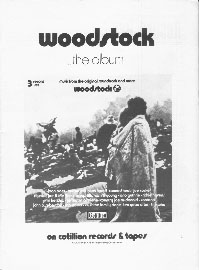![]()
  |

Woodstock (Soundtrack)
Cotillion 500
Released: May 1970
Chart Peak: #1
Weeks Charted: 68
Certified Gold: 5/22/70
 I spent a good part of the time I was at Woodstock perched precariously on a narrow wooden ledge that extended along the front of a huge outdoor stage. It was not the grooviest way to spend a weekend, but it was a hardship that was made endurable by the magic of the environment and the excellence of the music.
I spent a good part of the time I was at Woodstock perched precariously on a narrow wooden ledge that extended along the front of a huge outdoor stage. It was not the grooviest way to spend a weekend, but it was a hardship that was made endurable by the magic of the environment and the excellence of the music.
Like the film, Cotillion's three-disc musical documentary collection from the festival chronicles only a limited aspect of the sensations expressed and felt at Woodstock. But it's enough, if you will sit back and let the music happen. And that, after all, is what you should let all music do for you -- rock, jazz, Baroque, or whatever.
 Click image for larger view. |
I could go on: the Jefferson Airplane bringing life to the fading festival hours early Monday morning with their call for "Volunteers"; Sly and the Family Stone causing one of the largest spontaneous dance-ins ever seen anywhere; Sha-Na-Na bring back the Fifties; Country Joe and the Fish leading the Fish cheer (it doesn't spell "fish" but it does begin with an "f") and starting a group sing with the ragtime tune that has become a near anthem of the young anti-war rock freaks, "I-Feel-Like-I'm-Fixin'-To-Die Rag."
The part of Woodstock that is less apparent in the recordings was also less apparent in the film. And that is the sense of a social group coming to self-awareness -- what amounted to the politicization of a generation. The intervening months, however, have led me to believe that Woodstock represented the climax, and not the beginning, of that politicization. The growing sense of self that had begun with President Kennedy's creation of the Peace Corps back in 1961 came to full fruition with the community at Woodstock 1970.
At that frozen moment in time, both the power and the impotence of the Woodstock Nation became starkly clear. Everyone together as a kind of proto-community with a real sense of life? Yes. Woodstock showed how that could be a reality. But stop the rain? No. There are limits, even to the powers of a total community. If all the music and mud and togetherness of those very special three days showed us anything, it was the extent of those limits. And that may have been more important than the music -- or anything else.
- Don Heckman, Stereo Review, 9/70.
Bonus Reviews!
It took eight months to untangle, but the documentary three album set containing the sounds from Woodstock is out on Atlantic Records distributed on its Cotillion label, and its executives did all the legwork, although only one of their artists are featured, namely Crosby, Stills, Nash and Young.
Producer Eric Blackstead, who was in charge of the sound at the festival itself, edited the album from one hundred hours of tape. The artists appearing in the film are the same on the record with the exception of the Jefferson Airplane, the Butterfield Blues Band, and Canned Heat who appear on the disc and not on the screen. Also included, of course, are the documentary aspects of the event, such as Hugh Romney, leader of the Hog Farm, P.A. announcements and such.
The album is revolutionary in almost every way. it is truly a deluxe package. The only drawback is the price, it will cost you over fifteen dollars to buy it. The price in is line with the amount of work that went into the production.
"Negotiations were unbelievably complex and lengthy," said Jerry Wexler, Atlantic's Vice President. "We had to obtain clearance from the artist, the record companies, and in some cases the foreign affiliates and even producers. Four units to coordinate." Bob Rolontz, Atlantic's Vice President in charge of publicity and advertising, said, "It's a costly set as regards to royalties and we will have to sell and promote it really hard." Atlantic is also paying royalties to Woodstock Ventures.
When asked if the three records would ever be broken up and sold as iundividual single albums, Wexler replied, "If we sell out, really sell out, maybe we'll think about it."
- Circus, 7/70.
Bonus Reviews!
"I left one thing out of my Woodstock article," says Tom Smucker, author of a good one. "I left out how boring it was." And though you can be sure it's not like being there, this three-record set does capture that. As is inevitable in a live album featuring stage announcements, crowd noises, and sixteen different artists, not one side is enjoyable straight through: CSNY are stiff and atrociously flat in their second gig, Paul Butterfield sounds wasted, Sha Na Na should never record, Joan Baez should never record, and so forth. But a substantial proportion of this music sounds pretty good, and three performances belong to history: Ten Years After's "I'm Going Home" (speed kills), Joe Cocker's "With a Little Help from My Friends" (mad Englishman), and Jimi Hendrix's "Star Spangled Banner" (wotta ham). Also, the stage announcements and crowd noises are better than most. B
- Robert Christgau, Christgau's Record Guide, 1981.
Further reading on Super Seventies RockSite!: DVD Review: Article: |
- Bill Shapiro, Rock & Roll Review: A Guide to Good Rock on CD, 1991.
The wrong notes are jarring and the recording flaws seem obvious, but the energy and enthusiasm compensate. * * *
- Bruce Eder, The All-Music Guide to Rock, 1995.
Some cynics had opined that without the chemical additives, the music at Woodstock didn't sound that great. Balderdash. While not everything is mind-altering, there's a wealth of primo rock here: Ten Years After's jet-propelled "I'm Going Home," Santana's smokin' "Soul Sacrifice," Jimi Hendrix's "Star Spangled Banner." Hot tip: watch the movie first.
- Entertainment Weekly, 2001.
A historical document on vinyl from the most famous rock concert in the world, this album was recorded live, with accompanying weather, sound glitches and warning about brown acid. Cockeyed, flawed and invaluable for no other reason than as a reflection of the times when R&R could change the world, the landmark grab bag contains some schlock (Sha Na Na?!) but also amazing performances like Jimi Hendrix's noisy, drugged-out version of "The Star Spangled Banner." * * * * *
- Zagat Survey Music Guide - 1,000 Top Albums of All Time, 2003.
(2009 40th Anniversary Limited Edition) The 40th anniversary of Woodstock has, not surprisingly, given birth to a flurry of related products, ranging from CDs by associated artists to an extras-enhanced DVD of Woodstock, the movie. For our money, the best bet is this six-CD box, containing approximately one-fifth of all the festival's music, much of it available for the first time in any format. Arranged chronologically, and featuring songs from almost every act that played (missing in action: The Band and Ten Years After), it's a dandy primer and/or refresher course in why that mythic, muddy lovefest mattered, man.
A key selling point here is the trove of unreleased material, some of it -- three tunes from folkie Bert Sommer, the Grateful Dead's beatific "Dark Star" -- truly breathtaking. Given the mediocrity of many (though hardly all) of the performances from prior Woodstock releases, such gems easily make this the, uh, grooviest-ever distillation of that seminal event. Even so, we can already hear some grizzled completists complaining that Rhino didn't make good on its original plan to collect every scrap of the music on 30 CDs. Get real, tie-dyed daddies: They've gotta save something for the 50th-anniversary blowout, don't they? B
- Tom Sinclair, Entertainment Weekly, 8/14/09.
![]() Reader's Comments
Reader's Comments
No comments so far, be the first to comment.